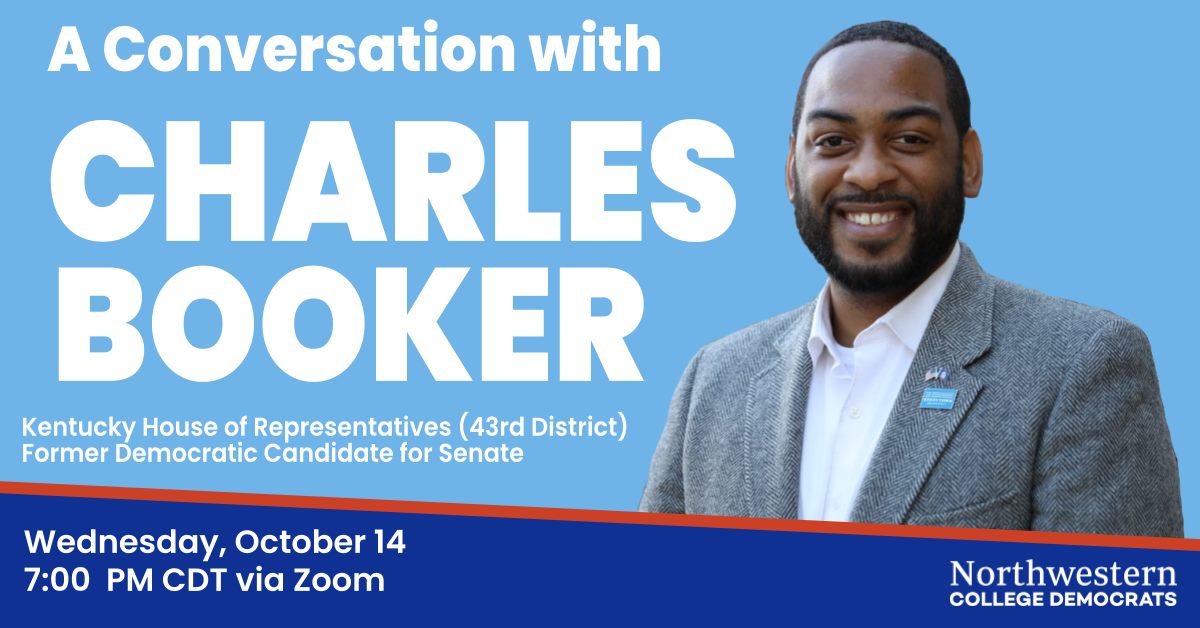When asked about what young people can do to participate in politics, Democrat Charles Booker said to turn frustration into action by organizing, disrupting and leading, during a Q&A hosted by the Northwestern College Democrats Wednesday night.
“I need you all to realize how much power you have,” he said to the audience of college students.
Booker, the youngest Black state lawmaker in Kentucky, said that despite his loss in Kentucky’s Democratic primary for U.S. Senate earlier this year, he plans to try again. He was narrowly defeated by Amy McGrath, a former Marine fighter pilot, after the race tightened in the weeks leading up to the election.
“I’m certainly not done causing good trouble,” Booker said. “We have two terrible Senators in Kentucky. So I’m praying on what that means for me in 2022. Stay tuned.”
As he spoke about his childhood and its influences on his political views, Booker was transparent about his struggles. Raised in Louisville, Kentucky, he grew up on food stamps, and both of his parents dropped out of high school. He remembered a time when his mother stopped eating because there was only enough food for him.

“That broke me down. It hurts even now to think about it,” Booker said. “But it gave me a sense of what compassion and love looks like. It allowed me to see humanity.”
With two daughters of his own, Booker has also made sacrifices for his children. As a Type 1 diabetic, he once had to ration his insulin so that he had enough money to feed his daughters. He fell into diabetic ketoacidosis, a diabetes complication that occurs when an individual doesn’t have enough insulin in their body.
“I nearly died,” he recalled.
As he described his start in politics, Booker joked that he worked as an assistant for everybody but didn’t intend to become a politician himself. However, after the murder of his cousin TJ, he decided to run for public office.
“You have to find your ‘why.’ Why are you getting up and fighting back? Why are you showing up when it’s difficult?” Booker said. “Dealing with that trauma made me take a stand.”
In response to a question from the moderator, Associate Professor of History Daniel Immerwahr, about what surprised him the most in the past year, Booker talked about how racism has come to the forefront of political conversations.
“We know it exists,” he said. “When you live under the direct, overt weight of systemic racism, you feel it in a very tangible way. You know it’s there.”
He criticized how the “highest office in the land” has weaponized hatred but commended those who protest against it.
“The thing that has really reaffirmed my faith and surprised me is seeing how so many people have pushed back,” he said.
As the topic shifted to money in politics, Booker expressed his disgust and frustration with the ways campaigns are funded. He suggested that campaigns be publicly funded to remove financial barriers for those trying to enter politics.
“It’s still a force that we have to recon with,” he said. “We’re breaking through. It’s happening. We’ve got to get big money out of politics.”
Booker urged students to get involved with politics by engaging with friends, using their voice on campus and starting locally. He also mentioned his organization “Hood to the Holler,” which breaks down racial and class barriers and builds political power, and he encouraged students to connect with it.
“We are at a moment that requires your leadership. It requires your voice. It requires your story. It requires your light,” Booker said. “You all are the change. While you’re on campus, know that you have so much power in this moment.”